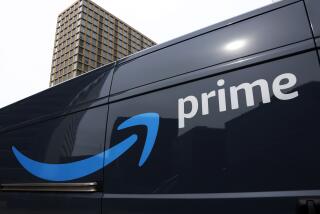Travel Agency Owners Charged in Frequent Flier Coupon Scam
- Share via
The owners of a Woodland Hills travel agency were charged Tuesday by a federal grand jury with using an airline’s reservations computer to accumulate frequent flier miles under fictitious names, then selling the coupons for free flights they obtained.
For a year and a half, James R. Winkleman and Phillip R. Rinker, owners of North Ranch Travel Agency, allegedly altered passenger lists in American Airlines’ computer system so that mileage accumulated by travelers not enrolled in the airline’s frequent flier program was credited to fictitious names, the indictment said. The frequent flier program allows participants to earn free flights on the airline after accumulating significant amounts of mileage credits for trips they take.
Winkleman and Rinker, both 35 and both from Woodland Hills, and Brenton Mullins, 29, of Playa del Rey, were each charged with 22 counts of conspiracy, wire and mail fraud, and use of fictitious names.
If convicted, each faces a maximum sentence of more than 100 years in state prison and fines up to $5.5 million.
In September, 1988, American Airlines filed a lawsuit against the three men, charging that they defrauded the company of a significant amount of money, said airline spokeswoman Mary O’Neill.
To settle the suit, Winkleman and Rinker agreed never to use the reservation system again and paid the airline a six-figure amount, O’Neill said. The suit against Mullins has not been settled yet, she said.
Assistant U.S. Atty. Gary S. Lincenberg, who is prosecuting the three men in federal court, said they used the American Airlines computer reservation system, which is accessible to authorized travel agents, to find travelers taking long journeys who were not members of the frequent flier program.
After the flights landed, the men changed the computer’s passenger records to indicate that the trip had been taken by one of at least 50 fictitious persons, for whom the men set up frequent flier accounts using post office boxes as addresses, the grand jury indictment said.
Passenger lists remain in the computer system for 24 hours after a flight lands, giving the men a one-day “window of opportunity” to change the records, Lincenberg said.
Once the accounts had accumulated sufficient mileage, the men applied for coupons for free flights, which they later sold, the grand jury indictment charges.
Lincenberg said that airline officials were alerted to the activity in June, 1987, when the passenger records for J. Knoer were altered before Knoer’s flight from Chicago landed in Germany.
When Knoer’s flight landed, he had trouble claiming his luggage because computer records showed his baggage claim number was held by a passenger named J. Smith. Shortly afterward, the airline contacted the FBI.
This is the second prosecution for such activities, Lincenberg said. Two people were convicted on similar charges in Tulsa, Okla.
O’Neill said the airline has taken security precautions to try to prevent fraud in the future, but she refused to elaborate.
More to Read
Sign up for Essential California
The most important California stories and recommendations in your inbox every morning.
You may occasionally receive promotional content from the Los Angeles Times.









